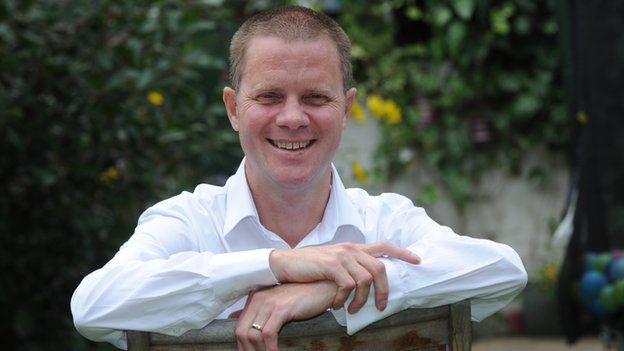Making the most of life with cystic fibrosis
- Published

Tim Wotton was told he wouldn't live past 17 because of cystic fibrosis, but having reached 43 he lives every day like it could be his last.
Every hour of every day is important for me as I never know when I will run out of time. Having the life-limiting condition cystic fibrosis (CF) drives my thirst for life.
I dress each day like it's my last day on Earth, and never leave my favourite clothes in the wardrobe waiting for that special moment. I don't see the need to gripe about the small things I hear around the office, instead I take time each day to appreciate something natural like a sunset or landscape. Every day should be punctuated by special moments.
For most of my adult life I was never happier than when my weekends were crammed full - I call them Windows 7 weekends.
I gave them that name because there are seven "windows" of social opportunity after work ends for the week: Friday evening, Saturday morning, afternoon and evening, and Sunday morning, afternoon and evening.
If I were able to fill all seven slots with an activity of some kind - sport, lunch, dinner, shopping, cinema, family, partying - then, in my mind, I was savouring every moment.
This full-on lifestyle spanned my late teens, university, all my twenties and early thirties, and was driven by the likelihood that I would die young.
Nowadays I have different priorities, but I still take full advantage of those windows in each day to fit in quality time with family, socialising, my business consultant job, and not forgetting my vital exercise in the form of hockey on Saturdays and evening gym sessions.
Cystic fibrosis is one of the UK's most common life-threatening inherited diseases, affecting over 10,000 people. It affects the internal organs, especially the lungs and digestive system, by clogging them with thick sticky mucus, making it hard to breathe and digest food. Each week, five babies are born with the condition, but also each week three young lives are also lost to it. There is currently no cure.
My wife, Katie, and seven-year-old son, Felix, provide the necessary motivation to keep on top of my survival battle and offer me a ready supply of life-affirming memories.
Katie, a senior nurse, understood my medical needs from day one, and was hardly ever phased by the sights and sounds of CF. I frequently cough so hard and for so long that I go into spasm and end up being sick on myself - often as I'm getting ready to go to work. A single coughing fit can last longer than an hour, and is exhausting. My wife pitches in to assist me, and has taken my life-expectancy worries in her stride. She appreciates my zest for life but reminds me to pace myself at times.
Felix has grown up surrounded by medical paraphernalia and has become accustomed to seeing me use my bizarre-looking nebulizer and taking my 40 tablets per day, which he calls "Daddy's sweets!"
I'm around for them as much as possible, and give Felix quality time, coaching him to play hockey, taking my turn to get up early with him at the weekend, going on family days out and taking Katie out for dinner. I achieve these things against a daily backdrop of two to three hours of treatment to maintain my CF, as well as regular visits to the GP, chemist and hospital. I'm only as healthy as my last treatment, so I have to think of it all as enabling rather than diminishing my life.
One cruel twist is that CF can be a lonely and solitary condition as us CFers are advised not to meet face-to-face for fear of making ourselves more ill from cross-infection (different people can carry different bacteria). It means we cannot socialise easily or give each other regular support.
This segregation of patients was enforced in CF clinics over four years ago, so I am no longer able to engage in waiting room small-talk with others who have the same condition as me. I've not been able to see my older CF mentor Chris in all that time, and can only connect via email now.
Although we can use social media, it's a shame that CF folk can't openly meet up and chew the fat. By not being able to see each other's body language, we miss out on the most powerful form of communication.
As much as I despise my daily health battle, it has given me a perspective on life that many people may never attain or will only encounter later in life. People with a life-threatening condition have a pronounced ability to not only identify, but fully appreciate magic moments, as they contrast so strikingly with the usual daily hardship. I find it liberating to look at each day as potentially my last day on Earth.
Tim Wotton appeared on the latest podcast from BBC Ouch and has written a book How Have I Cheated Death?
Follow @BBCOuch on Twitter and on Facebook, and listen to our monthly talk show